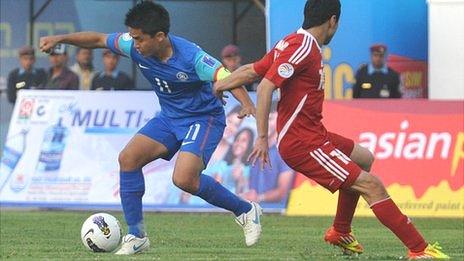India's Mohammedan Sporting football club faces closure
- Published
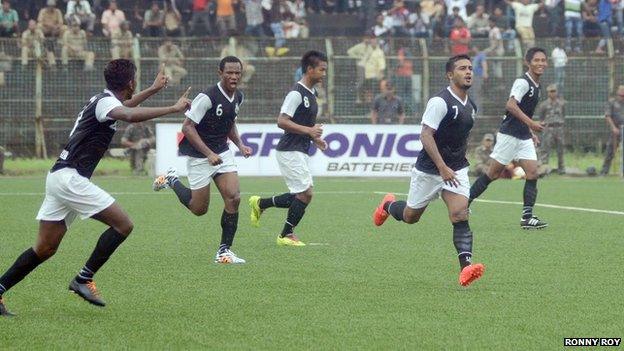
Mohammedan Sporting was the first Indian club to win the Calcutta League
One of India's oldest football teams, Mohammedan Sporting, is facing the threat of closure because of financial problems. Ronojoy Sen recounts the history of an iconic club.
On 29 August 1936 the Scottish Daily Express ran a story headlined: "Indian Juggler - New Style".
The newspaper's reporter was in raptures about an Indian player who had turned out for Celtic FC and "hypnotised" the crowd with his skills.
The footballer in question was Salim, a member of Calcutta's Mohammedan Sporting Club, which that year had won the Calcutta First Division Football League for the third time in a row.
In 1934, Mohammedan Sporting was the first Indian club to win the Calcutta League - which began in 1898 and is the oldest in Asia.
Eighty years later, on 20 October 2014, the club, plagued by financial troubles, decided to disband its senior team. The present is a long way from the club's glory days.
Mohammedan Sporting came into existence in 1891, more than a decade before the Muslim League party was formed to voice the interests of the Muslims of the Indian subcontinent.
Rare win
Amazingly in its first season in the Calcutta League in 1934, Mohammedan Sporting won the title. In 1936, the club achieved the rare double of winning both the League and the IFA Shield, becoming only the second Indian team after Mohun Bagan to win the Shield.
Only three British teams - Royal Irish Rifles, the Gordon Highlanders and the Calcutta Football Club - had achieved this distinction.
The euphoria over Mohammedan Sporting's victories spread like wildfire.
Every match played by the club drew a huge crowd. The nationalist English daily, Amrita Bazar Patrika, reported that the "popularity of the team increased with every match" and the gates would have to be closed long before the match began.
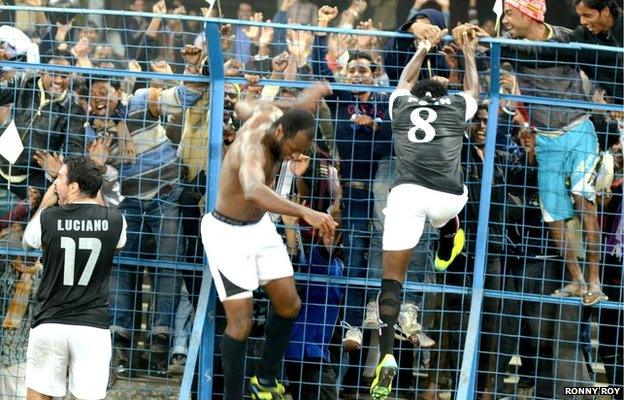
The club's big following has little to cheer these days
The crowds that thronged to watch Mohammedan Sporting play comprised young men as well as older people, including clerics.
In 1935, for instance, some 60,000 people turned up to watch Mohammedan Sporting defeat Mohun Bagan at the Calcutta Football Club ground.
After the victory, as a newspaper reported, "fireworks were lit, balloons sent up, pigeons released and the Mohammedans of Calcutta made merry till late in the night".
Inspiration
There were good reasons for Mohammedan Sporting's success.
The club broke with the practice of its main Calcutta rivals, Mohun Bagan and East Bengal, by recruiting players from outside Bengal.
In this it had a significant advantage over its city rivals since it could recruit Muslim players from all over the subcontinent. Indeed, the club recruited players from as far afield as Quetta and Peshawar in modern-day Pakistan.
The club also decided its players should wear boots when it was wet. This was enormously important for its success since it was the practice of the major Calcutta clubs to play barefoot whatever the weather.
In 1933 six Mohammedan Sporting players donned boots for the first time on a wet day and thrashed a local side by an incredible 16-0 margin.
The impact of the club's astounding success was hardly limited to the football pitch. Muslim poets like the great Kazi Nazrul Islam were inspired to compose poetry in honour of the team.
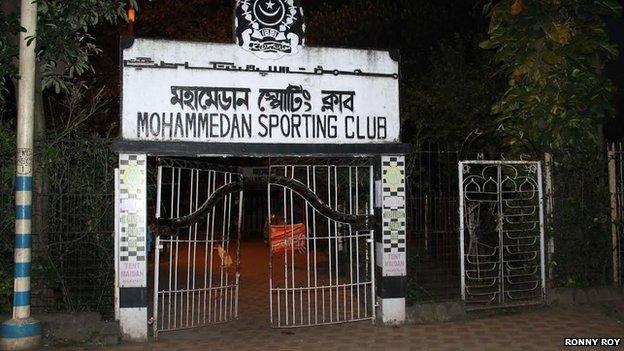
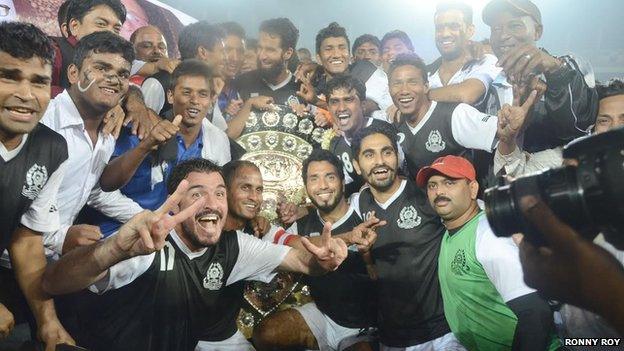
Happier days - when Mohammedan Sporting was winning tournaments
At the same time, Muslim leaders claimed the victory as a signal event for the community. A prominent regional Muslim leader and future premier of Bengal, Fazlul Huq, noted that Mohammedan Sporting had "earned a name for Muslims in the sporting world, of which the community may justly be proud".
After Mohammedan Sporting won another major trophy - the Rovers Cup held in Bombay (now Mumbai) in 1940 - the Muslim League leader and founder of Pakistan Muhammad Ali Jinnah told Muslim students that the "discipline which sports teaches must be harnessed for the benefit of the Muslim community as a whole".
Indian independence, the partition of the sub-continent and the migration of many patrons of Mohammedan Sporting to East and West Pakistan dealt a blow to the club.
Tough decisions
The most notable aspect of Mohammedan Sporting's evolution in independent India was the composition of the club's team.
In the 1950s the team was still composed primarily of Muslims. From the 1960s, however, non-Muslim players joined the club in greater numbers.
In the early 1980s, bankrolled by a Calcutta Muslim businessman, the club managed to attract players from the Mohun Bagan and East Bengal teams and win several tournaments.
Mohammedan Sporting won the Calcutta League in 1981, after a gap of nearly 15 years, with as many as eight Hindus - including upper-caste Brahmins - turning out for the side.
That legacy counts for little now.
The club has had funding problems over the past several years and was relegated to the second division of India's premier football competition, the I-League, in 2013-14.
Though this is not the end of the road for the 123-year-old club, its administrators will have to take some tough decisions and provide astute leadership to keep Mohammedan Sporting afloat.
The writer teaches at the National University of Singapore. He is the co-editor of Being Muslim in South Asia: Diversity and Daily Life (2014).
- Published18 February 2013
- Published11 April 2012
